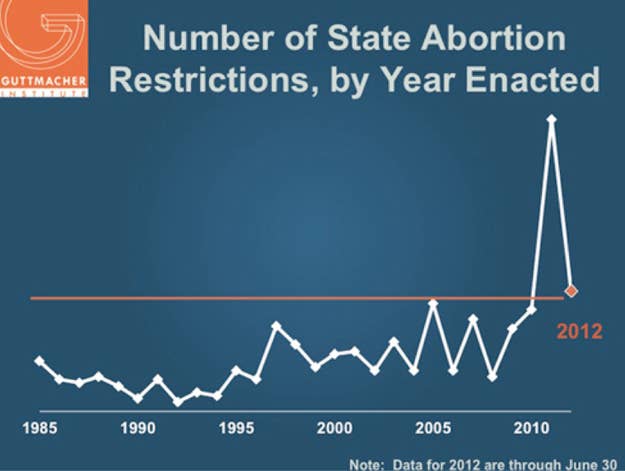
The boom in new laws restricting abortion in America appears to be ending, sparking a heated debate over why state legislatures are cooling on the subject.
States have passed 39 restrictions on abortion this year, down from 80 by this time last year, and researchers at the abortion- and reproductive-rights group the Guttmacher Institute have noticed a trend: restrictions that pass one state legislative body are having a tougher time actually becoming law. Just 30 percent of bills that passed one chamber become law this year, compared to 51 percent in the first half of 2011.
Guttmacher's report on the subject offers a few reasons for this. Election-year legislative sessions tend to focus less on social issues, and some states are in legislative stalemates that prevent them from getting anything done. But the report also speculates that pushback from the public may have stopped some restrictions from becoming law. For instance, public opposition to Virginia's proposed bill requiring women seeking abortions to have transvaginal ultrasounds may have resulted in that requirement being dropped from the final law. And the failure of Mississippi's personhood amendment with voters last year could have helped take down similar efforts in Ohio and Oklahoma.
Guttmacher State Issues Manager Elizabeth Nash told BuzzFeed Shift that she hopes the downward trend in laws passed will continue, and that her organization hopes to "build on this momentum" to keep the number of new abortion restrictions dropping.
Keith Mason, founder of Personhood USA, which sponsored the Mississippi amendment, said that the number of restrictions was dropping not because people disagreed with them ideologically but because "we've seen a lack of effectiveness in those regulations because they're not being abided by in the abortion industry." He pointed to hidden-camera videos by the anti-abortion group Live Action, one of which recently claimed to show Planned Parenthood employees agreeing to schedule sex-selective abortions (Planned Parenthood says it does not perform abortions on the basis of sex). Mason said his group was seeing "a shift to focusing on the core," legislation that defines the fetus as a person and outlaws all abortion, rather than restricting it in various ways.
He also called the claim that the failure of Mississippi personhood had harmed efforts in other states "totally absurd." He pointed to his group's decision to appeal the proposed Oklahoma personhood measure (which was struck down by a state court before it made it to the ballot) to the Supreme Court as a sign that they were right where they wanted to be.
Nash, though hopeful, said anti-abortion groups did continue to make gains. She pointed out that although the pass rate has slackened slightly since last year, the first half of 2012 has still seen more abortion restrictions passed than the first half of any year before 2011. This year's laws include limits on medication abortion, bans on abortion before viability (which run counter to Roe v. Wade), and limitations on abortion coverage in the state insurance exchanges established by the Affordable Care Act. And in April, Utah passed a law mandating the longest waiting period for an abortion in any state, 72 hours between mandatory counseling and the actual procedure. Said Nash, "we have a lot of work ahead of us."
Update: A spokesperson for the anti-abortion group Susan B. Anthony List says they don't see a downturn in anti-abortion legislation. Communications Director Mallory Quigley said in a statement to BuzzFeed, "In 2012, states boldly passed measures that protect unborn children and taxpayers from the violence of abortion, building off of the gains of 2011. Momentum is clearly on the side of Life." She cited North Carolina's recent defunding of Planned Parenthood as an example.
